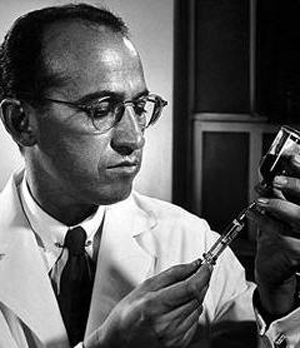
In 1955, when Jonas Salk's successful polio vaccine was announced, CBS newsman Edward R. Murrow famously asked the scientist: who owns the patent on this new drug that has finally wiped out one of the most dreaded scourges of the century? Salk replied matter-of-factly: "Well, the people, I would say. There is no patent."
He paused, as if to let this seemingly obvious fact sink in, then continued: "Could you patent the sun?"
Fast-forward a half century, and Salk's statement seem quaint, if not downright quixotic.
This week the U.S. Supreme Court is hearing arguments on a case that some see as the end of the slippery slope of intellectual property in medicine -- determining if Myriad Genetics can patent naturally-occurring genes that predispose women to breast cancer. The so-called BRCA genes were first discovered using public funds at the University of California-Berkeley, but Myriad invested in sequencing the genes and developing a test, for which they charge up to $4,000.
Many breast cancer research advocates were furious about the expensive patented test, and they teamed up with the American Civil Liberties Union to pressure Myriad in court to relent and give women everywhere access to testing that shows whether they carry the breast cancer genes.
The businessman behind Myriad is Kevin Kimberlin, an American venture capitalist whose first foray into medicine was in the 1980s, with Dr. Salk. Kimberlin had approached the venerable researcher to see if he could tackle the world's most recent scourge: AIDS.
Dr. Salk agreed, and he developed a drug called Remune, which showed promise in boosting immunity and preventing HIV transmission. But there was a catch. Kimberlin insisted that Dr. Salk had to do something he swore he would never do -- patent the drug.
It got worse. When Dr. Salk wanted to develop the drug as a vaccine to prevent transmission of the HIV virus, Kimberlin refused, arguing there was far more profit in marketing the drug as a life-saving treatment for HIV-infected patients.
In less than a half century, the man who had come to symbolize egalitarianism in medicine was being co-opted by the pharmaceutical industry he helped create.
Salk's soul searching
What few people know is that back in 1955 Dr. Salk entertained the idea of patenting his inactivated poliovirus vaccine. His son, Peter Salk, recently came across the patent application amongst his father's papers, and along the margins were his father's hand-written notes, questioning the value and the ethics of capitalizing on his discovery.
In Jonas Salk's time, corporate shareholders weren't clamoring for blockbuster returns from blockbuster drugs. Polio vaccine research was funded by the government, and supplemented by the March of Dimes, a campaign that literally collected dimes from people to support polio research, so Dr. Salk decided to reject the patent application back in 1955.
By the 1980s, Dr. Salk was struggling with the same decision with his new AIDS vaccine, but times had clearly changed. In the end he realized it was the only way the work would get done. The man who swore never to patent the sun... did just that.
Watch Jonas Salk disavow patents for life saving drugs in an interview with Edward R. Murrow:
Read more: Health, Science + Tech














Tyee Commenting Guidelines
Comments that violate guidelines risk being deleted, and violations may result in a temporary or permanent user ban. Maintain the spirit of good conversation to stay in the discussion.
*Please note The Tyee is not a forum for spreading misinformation about COVID-19, denying its existence or minimizing its risk to public health.
Do:
Do not: